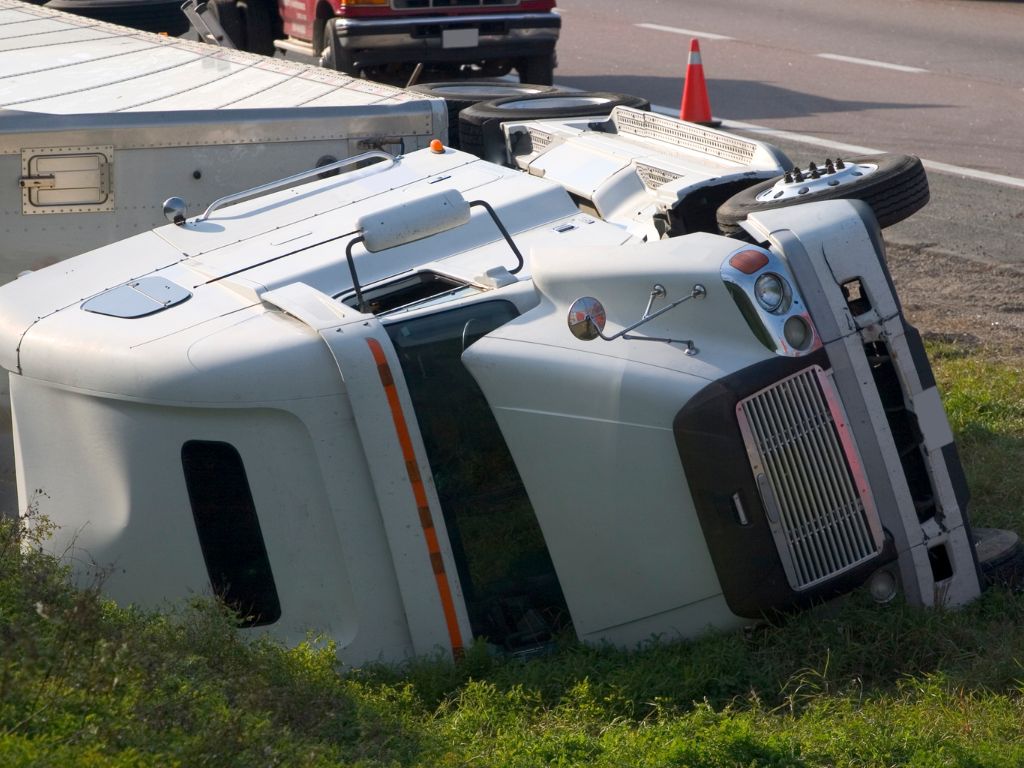Truck accidents in Reading, PA, present a unique set of challenges. Unlike typical car collisions, a truck accident often involves multiple parties, intricate regulations, and severe damages. As the roads of Reading see an increasing number of trucks, understanding these complexities becomes paramount.
Navigating the maze of insurance claims post-accident can be daunting. It's riddled with paperwork, negotiations, and often, pushback from insurance companies. Recognizing the intricacies of this process and the potential pitfalls is crucial. More than ever, victims need to arm themselves with information and, most importantly, seek the guidance of professionals like the Reading truck accident lawyers at Munley Law Personal Injury Attorneys.
Understanding Truck Accidents in Reading, PA

Common Causes of Truck Accidents in Reading
- Driver Fatigue: According to the National Highway Traffic Safety Administration (NHTSA), fatigue is a leading cause of truck accidents nationwide. Long hours on the road without adequate rest can impair a driver's judgment and reaction time.
- Equipment Failure: Trucks require regular maintenance. Brake failures or tire blowouts can occur when overlooked, leading to catastrophic accidents.
- Improper Loading: Overloading or unevenly distributing cargo can cause trucks to tip or lose control, especially on Reading's winding roads.
- Distracted Driving: The Pennsylvania Department of Transportation reports that distracted driving, including texting or using a phone while driving, remains a significant concern for all vehicles, but the consequences are magnified with trucks due to their size.
Differences Between Truck and Regular Vehicular Accidents
- Severity of Injuries: Truck accidents often result in more severe injuries or fatalities. The NHTSA notes that in collisions between a truck and a passenger vehicle, the latter's occupants typically suffer the most.
- Complex Liability: Multiple parties can be held responsible in truck accidents, from the driver to the trucking company or even equipment manufacturers. This complexity necessitates the expertise of a Reading Truck Accident Lawyer.
- Regulatory Involvement: Trucks operate under different federal and state regulations. Violations of these regulations, such as exceeding allowed driving hours, can cause accidents.
Understanding these nuances is crucial for those affected by truck accidents in Reading. It underscores the importance of seeking specialized legal counsel to navigate the complexities of such incidents and understand your rights as a truck accident victim.
Immediate Steps to Take After a Truck Accident
1. Ensure Safety First: The immediate surroundings can be chaotic after a truck accident. Before anything else, ensure you're out of harm's way. If possible, move your vehicle to the side of the road to 
2. Seek Medical Attention: Even if you feel fine, getting a medical check-up is vital. Some injuries, like concussions or internal injuries, might not be immediately apparent. A prompt medical evaluation ensures your well-being and provides essential documentation for any subsequent claims.
3. Report to the Police: Always call the police to the truck accident scene. They'll create an official accident report, which becomes crucial evidence. This report often contains details that can be pivotal when determining fault or liability.
4. Document the Scene: Take photos of the accident scene from various angles if you can. Capture the positions of all vehicles involved, any skid marks, road conditions, relevant road signs, any visible injuries sustained, and visible property damage. These images can provide a visual record and support your account of the incident.
5. Gather Witness Statements: Eyewitnesses can offer an unbiased perspective of the accident. Approach any witnesses, request their account, and collect their contact information. Their testimonies can be invaluable, especially when discrepancies exist in the involved parties' accounts.
6. Notify Your Insurance Company: Contacting your insurance company after an accident is crucial for several reasons. Prompt reporting ensures that the incident is documented accurately and timely, preserving your right to file a claim. Additionally, it initiates the process of obtaining compensation for damages or injuries. Failing to notify your insurer promptly might lead to complications or denials in claim settlements.
In the aftermath of a truck accident, these steps lay the groundwork for any legal actions or insurance claims that might follow. Being thorough and systematic can make a significant difference in the outcome of your case.
The Role of The Insurance Company
Insurance companies have a set procedure for assessing truck accident claims. Initially, they review the accident's details, including the police report, photographs, witness statements, and medical records. They'll also consider the truck's maintenance history, driver's records, and any potential violations of transportation regulations. This comprehensive evaluation helps them determine liability and the claim's validity.
Remembering that insurance companies aim to protect their bottom line is essential. As a result, adjusters might employ various tactics to reduce your compensation:
- Disputing Liability: Adjusters often scrutinize the details to find inconsistencies or ambiguities that can shift blame away from their policyholder.
- Questioning Medical Expenses: They might argue that certain treatments weren't necessary or that injuries were pre-existing, aiming to reduce medical compensation.
- Quick Settlement Offers: Some adjusters might approach victims with swift settlement offers, hoping they'll accept a lower amount without fully understanding their entitlements.
- Delaying Claims: By dragging out the claim process, insurance companies bank on claimants, becoming desperate and settling for less.
Being aware of these tactics is crucial. It underscores the importance of having a strong advocate, like a legal professional, to ensure victims receive the fair compensation they deserve.
The Importance of a Reading Truck Accident Attorney
Navigating the intricacies of truck accident claims requires a specialized skill set that a dedicated truck accident lawyer possesses. These attorneys are well-versed in the nuances of trucking regulations, liability determinations, and insurance company tactics. Their expertise can differentiate between a successful claim and a disappointing outcome.
A specialized lawyer understands the multifaceted nature of truck accidents. Unlike regular vehicular accidents, truck collisions can involve multiple liable parties—from the driver to the trucking company and even parts manufacturers. Determining who is at fault requires a deep dive into truck maintenance records, driver logs, and company practices. An experienced attorney knows precisely where to look and what questions to ask.
Moreover, the legal landscape of truck accidents is laden with federal and state regulations. A local trucking attorney brings an intimate knowledge of Pennsylvania's specific laws and regulations. This familiarity can be invaluable, especially when local ordinances or state-specific rules come into play.
Another advantage of hiring an attorney is their established relationships within the legal community, which can make all the difference. They often connect with expert witnesses, accident reconstruction specialists, and medical professionals, expediting the claim process and bolstering the strength of the case.
Insurance companies are notorious for their tactics to minimize payouts. A skilled attorney is adept at countering these strategies, ensuring victims aren't shortchanged. They can skillfully negotiate with insurance adjusters, pushing for a settlement reflecting the damages and trauma suffered.
While the aftermath of a truck accident can be overwhelming, having a specialized lawyer by one's side can simplify the process. Their expertise, local knowledge, and dedication ensure that victims navigate the claim process confidently and clearly, maximizing the chances of a favorable outcome.
Determining Liability in Truck Accidents
Determining liability in truck accidents is multifaceted, often involving more than just the truck driver. Multiple parties can often share the blame, making the quest for justice a complex endeavor.
Beyond the truck driver, who might be at fault due to fatigue, distraction, or other reasons, the trucking company can also be liable. They might have pushed the driver to exceed safe driving hours, neglected essential vehicle maintenance, or failed to conduct thorough background checks on their drivers. Their role in the accident cannot be overlooked, as their practices and policies can directly contribute to the incident.
Manufacturers, too, can be part of the liability equation. If a truck's malfunctioning part led to the accident, the manufacturer of that part could be held responsible. Whether it's a faulty brake system, a defective tire, or any other compromised component, pinpointing these issues is crucial in pursuing justice.
Federal and state regulations play a pivotal role in determining fault. These regulations set standards for truck maintenance, driver hours, cargo loading, and more. Any violation of these rules can be a significant factor in establishing liability. A Reading Truck Accident Lawyer is adept at navigating these regulations, ensuring that any breaches are highlighted and used to strengthen the victim's case.
Calculating Damages and Compensation
Calculating damages and compensation after a truck accident is a critical step in ensuring victims receive what they rightfully deserve. The process involves a thorough assessment of tangible and intangible losses, aiming to restore the victim to their pre-accident state financially.
Medical bills often form the bulk of tangible damages. These include immediate treatments, surgeries, medications, and long-term therapies or rehabilitation. Given the severity of injuries that truck accidents can inflict, these costs can quickly escalate, making accurate documentation and calculation essential.
Lost wages represent another significant component of damages. If a victim cannot work due to their injuries, either temporarily or permanently, they're entitled to fair compensation for the income they've lost and potential future earnings. This calculation can be straightforward for salaried employees but might require expert testimony for those with variable incomes.
Pain and suffering, while intangible, are equally vital in the compensation equation. These damages account for the physical pain, emotional trauma, and the overall reduction in the quality of life post-accident. Quantifying such subjective experiences often involves legal expertise, drawing on precedents and the case's specifics.
Several factors can influence the final compensation amount. The severity of the injuries, the clarity of liability, the victim's age, and even their pre-accident health can all play a role. Additionally, the skill of the legal representation can significantly sway the outcome, emphasizing the importance of thorough, informed advocacy in these cases.
Tips for a Successful Insurance Claim
Navigating the insurance claim process after a truck accident can be daunting, but with the right approach, victims can maximize their chances of a successful outcome. Here are some essential tips to ensure a smooth and effective claim process when dealing with insurance companies:
Timely Reporting: Inform your insurance company immediately after the accident. Delays can raise suspicions about the claim's legitimacy, potentially complicating the process. Prompt reporting also ensures that the event's details remain fresh in your mind, leading to a more accurate account.
Thorough Documentation: Gather as much evidence as possible, including photographs of the accident scene, witness statements, medical records, and other relevant documents. A well-documented claim with detailed information is harder for insurance adjusters to dispute.
Seek Medical Attention: Even if injuries seem minor, always get a medical check-up. Some injuries manifest symptoms later, and having a medical record immediately after the accident strengthens the link between the incident and any subsequent health issues.
Be Wary of Early Settlement Offers: Insurance companies might present a quick settlement offer, hoping victims will accept without fully understanding their rights. Always consult a legal professional before agreeing to any terms, as you could be entitled to a better settlement.
Maintain Communication Records: Keep a log of all interactions with the insurance company. This includes dates, times, representatives' names, and the discussion's content. Having a detailed record can be invaluable if disputes arise.
Avoid Giving Recorded Statements: Insurance adjusters might request a recorded statement. It's advisable to decline until you've consulted with an attorney. What you say can be used against you, potentially undermining your claim.
Stay Informed and Avoid Common Pitfalls: Understanding the claim process and potential pitfalls is crucial. Some victims inadvertently damage their claims by posting about the accident on social media or failing to follow medical advice. Awareness of these common mistakes and staying informed can significantly impact the claim's success.
By following these tips and remaining vigilant, victims can effectively navigate the insurance claim process and ensure they receive the compensation they deserve.









